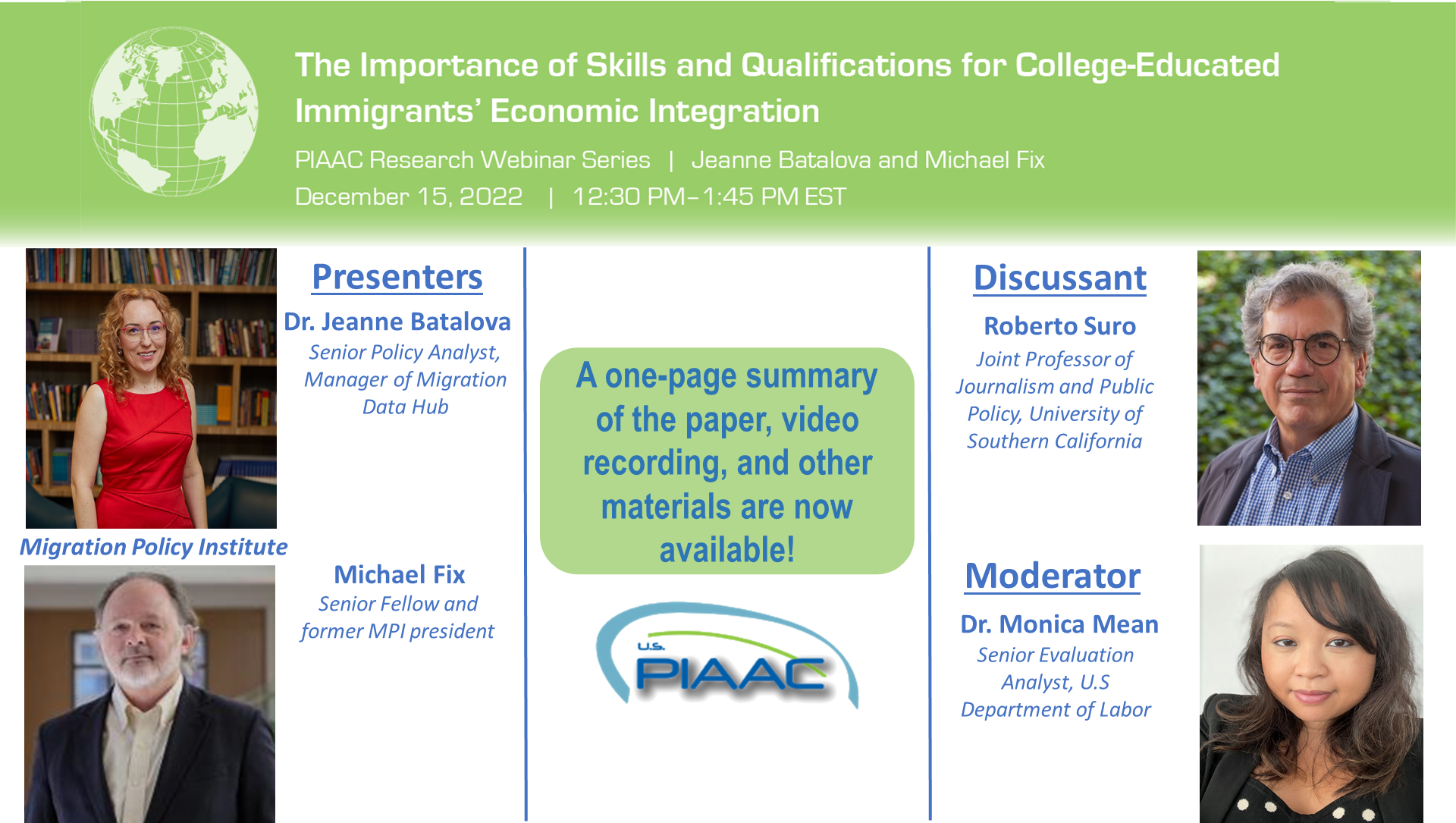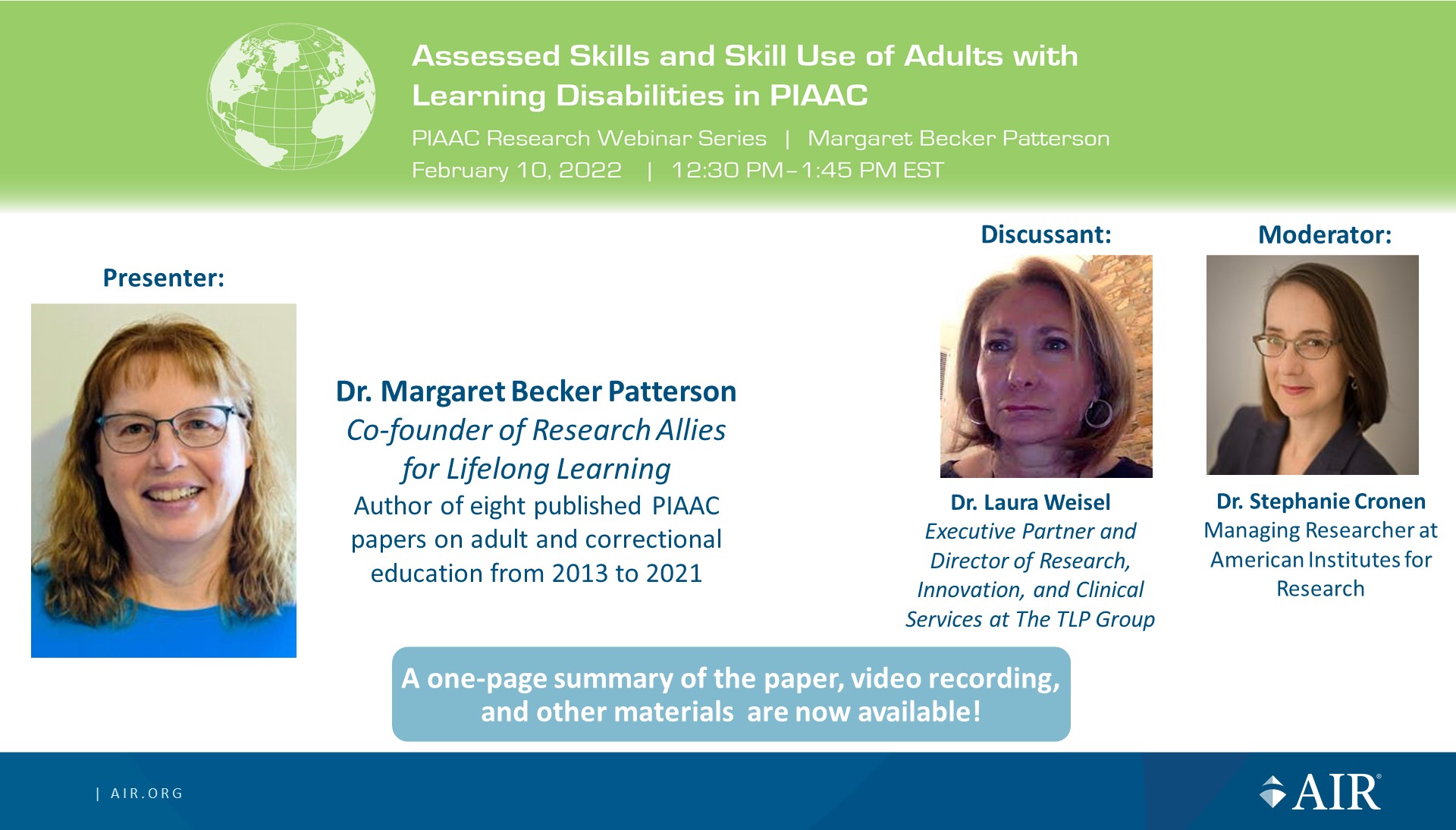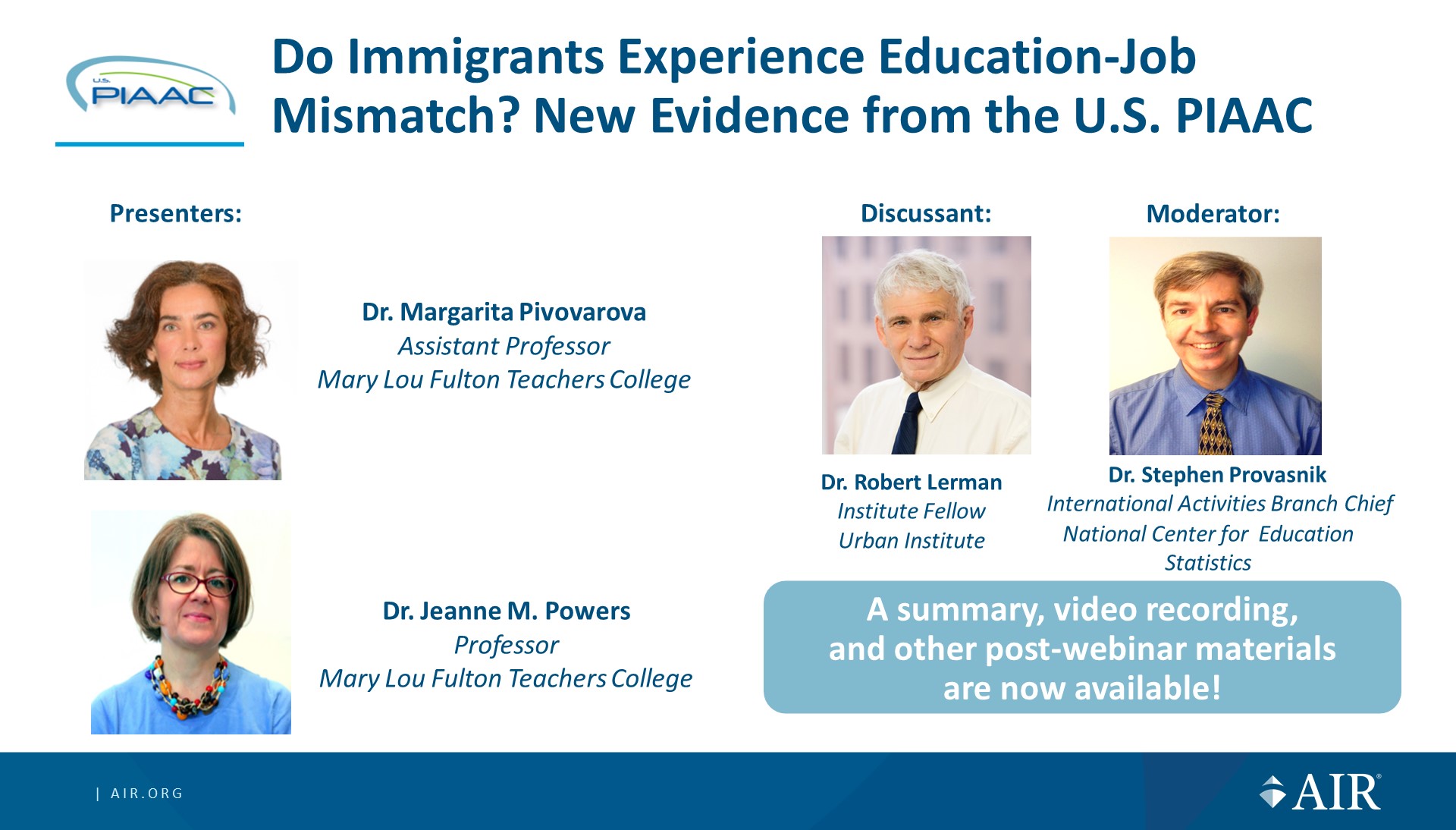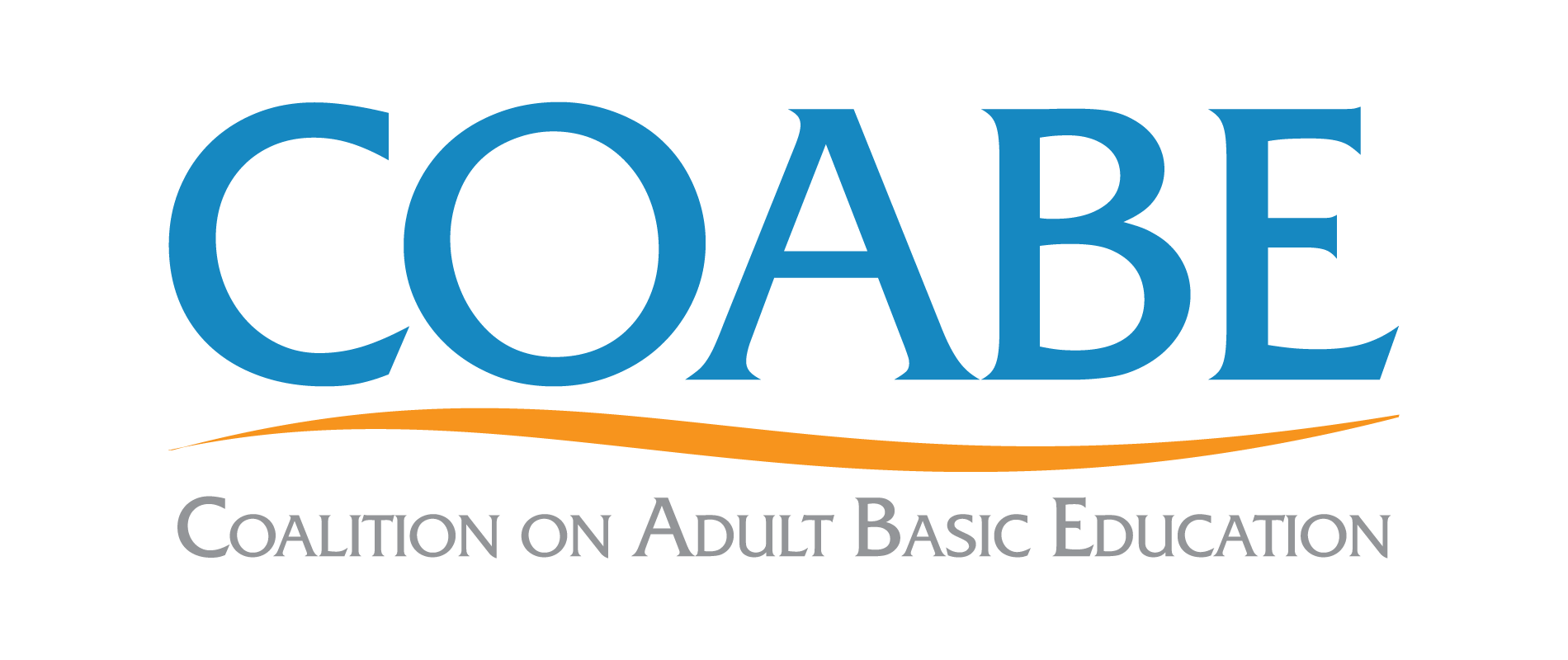The PIAAC Research Webinar Series are virtual presentations of AIR commissioned papers by the authors who used PIAAC data to explore topics associated with adult competencies in literacy, numeracy, and digital problem-solving. Most recent webinar is on the top. Scroll down to view other webinars.
| Date | Title | Webinar Information |
|---|---|---|
| 4/20/23 | A First Look: Examining Information Processing Skill Proficiencies Among Black Adults in the U.S. Using the PIAAC Data This webinar is based on findings from a PIAAC research paper that investigates processing skill proficiencies among Black adults in the U.S. Presenters:
Moderator: Dr. Stephen Provasnik, National Center for Education Statistics |
Conference Agenda |
| Date | Title | Webinar Information |
| 12/15/22 | 
|
Conference Agenda |
| Date | Title | Webinar Information |
| 2/10/22 | 
|
Conference Agenda |
| Date | Title | Webinar Information | 9/14/21 | 
|
Conference Agenda |
A First Look: Examining Information Processing Skill Proficiencies Among Black Adults in the U.S. Using the PIAAC Data- April 20, 2023
Panelists:
Presenters: Dr. Leah Katherine Saal, Loyola University Maryland; Dr. Takashi Yamashita and Dr. Ramon B. Goings, University of Maryland, Baltimore County
Discussant: Dr. Geleana D. Alston, North Carolina A&T State University
Moderator: Dr. Stephen Provasnik, National Center for Education Statistics
Does education and health-related literature tend to accurately convey the heterogeneous information processing skill profile of the diverse Black or African American U.S. population? What within-group differences can be observed using PIAAC data, and how might these differences inform policymakers and practitioners in the 21st century?
Please join us on April 20th, 2023, for a presentation and discussion on findings from a recent Program for the International Assessment of Adult Competencies (PIAAC) research paper authored by Dr. Leah Katherine Saal, Dr. Takashi Yamashita, and Dr. Ramon B. Goings. Registrants will have the opportunity to participate in small and large group discussions during the webinar.
From 2000 to 2016, there was a 100% increase in postbaccalaureate enrollment among Black adults. There is, however, a significant gap between Black female (70%) and males (30%) enrollees. A host of demographic and socioeconomic characteristics, nuancing the skills profile of Black adults, have been historically underreported on. In this paper, Dr. Saal, Dr. Yamashita, and Dr. Goings buck this trend of oversimplification by looking closely at subgroup populations to understand how education, employment, health, social trust, civic engagement, and more relate to information processing skill levels within the Black adult U.S. population.
Read the full research paper here
Conference Agenda
Webinar Recording
Bios of Presenters
PowerPoint Slide Deck
Evaluation Form
One-Page Summary of Paper
Webinar Questions and Answers
PIAAC Team
The Importance of Skills and Qualifications for College-Educated Immigrants’ Economic Integration - December 15, 2022
-
Presenters: Dr. Jeanne Batalova and Michael Fix, Migration Policy Institute (MPI)
Discussant: Dr. Roberto Suro, University of Southern California
Moderator: Dr. Monica Mean, U.S. Department of Labor
How do key demographic, skill, and employment characteristics of college-educated U.S. immigrants differ from their native-born counterparts? Do greater skills always translate to better employment? What other factors moderate the relationship between skill level and economic integration?Please join us on December 15th, 2022, for a presentation and discussion on findings from a recent Program for the International Assessment of Adult Competencies (PIAAC) research paper authored by Jeanne Batalova and Michael Fix. Using combined 2012/14/17 U.S. PIAAC data from over 12,000 participants, the authors explore relationships between cognitive skills, employment, and numerous other factors pertaining to the varied economic integration of college-educated U.S. immigrants.
Between 1990 and 2019, the percentage of U.S adults that are college educated rose from 20% to 33%. Among individuals who have immigrated to the U.S. recently, this percent rose from 27% to 48% between 1990-2019. Still, certain skill discrepancies are observed in the PIAAC data. Combined with additional barriers to economic integration such as citizenship issues and lack of social or professional networks, Migrant Policy Institute estimates $40 billion in forgone wages by underutilized immigrant workers. This paper highlights encouraging aspects of the state of immigrant economic integration, including their greater average monthly earnings than U.S. born, college-educated adults.
-
Description text goes here
-
Description text goes here
Panelists:
Presenters: Dr. Jeanne Batalova and Michael Fix, Migration Policy Institute (MPI)
Discussant: Dr. Roberto Suro, University of Southern California
Moderator: Dr. Monica Mean, U.S. Department of Labor
How do key demographic, skill, and employment characteristics of college-educated U.S. immigrants differ from their native-born counterparts? Do greater skills always translate to better employment? What other factors moderate the relationship between skill level and economic integration?
Please join us on December 15th, 2022, for a presentation and discussion on findings from a recent Program for the International Assessment of Adult Competencies (PIAAC) research paper authored by Jeanne Batalova and Michael Fix. Using combined 2012/14/17 U.S. PIAAC data from over 12,000 participants, the authors explore relationships between cognitive skills, employment, and numerous other factors pertaining to the varied economic integration of college-educated U.S. immigrants.
Between 1990 and 2019, the percentage of U.S adults that are college educated rose from 20% to 33%. Among individuals who have immigrated to the U.S. recently, this percent rose from 27% to 48% between 1990-2019. Still, certain skill discrepancies are observed in the PIAAC data. Combined with additional barriers to economic integration such as citizenship issues and lack of social or professional networks, Migrant Policy Institute estimates $40 billion in forgone wages by underutilized immigrant workers. This paper highlights encouraging aspects of the state of immigrant economic integration, including their greater average monthly earnings than U.S. born, college-educated adults.
Registrants will have the opportunity to participate in small and large group discussions during the webinar.
Read the full research paper here
Assessed Skills and Skills Use of Adult with Learning Disabilities in PIAAC - February 10, 2022
Panelists:
Presenter: Margaret Becker Patterson, Research Allies for Lifelong Learning
Discussant: Laura Weisel, The TLP Group: PowerPath to Education & Employment – Align & Redesign
Moderator: Stephanie Cronen, American Institutes for Research
What are the numeracy and digital problem-solving skills of U.S. adults with learning disabilities (LD)? How do adults with LD use their skills at work and at home? How do their skills compare with the skills of general population? What is the role of co-existing health and disabling conditions (e.g., vision and auditory difficulties as well as permanent disability)?
Please join us on February 10th, 2022, for a presentation and discussion on findings from a recent Program for the International Assessment of Adult Competencies (PIAAC) research paper authored by Margaret Patterson. Using the combined 2012/14/17 U.S. PIAAC data of over 12,000 participants, Margaret explored the relationships between several demographic characteristics, skill levels, and skill use of U.S. adults with LD in different settings and employment status.
Approximately 9.4% of adults reported having LD. While adults with LD may have a desire to learn and strengthen their skills, the rates of uncompleted education are high among this demographic. Findings suggest that using numeracy skills and digital literacy skills matter in gaining – or keeping – the skills themselves. Knowing relationships of assessed skills with skill use for this population may help in identifying strategies educators can implement to support adult program completion. In addition, the author states that having this knowledge can be beneficial to employers, and policy makers as it can identify strategies to best assist adults with LD.
Registrants will have the opportunity to participate in small and large group discussions during the webinar.
Read the full research paper here
Conference Agenda
Webinar Recording
Bios of Presenters
PowerPoint Slide Deck
Evaluation Form
One-Page Summary of Paper
Webinar Questions and Answers
PIAAC Team
Do Immigrants Experience Education-Job Mismatch? New Evidence from the U.S. PIAAC - September 14th, 2021
Panelists:
Presenters: Margarita Pivovarova and Jeanne M. Powers, Mary Lou Fulton Teachers College at Arizona State University
Discussant: Robert Lerman, Institute Fellow, Urban Institute
Moderator: Stephen Provasnik, International Activities Branch Chief, National Center for Education Statistics
On September 14, the AIR-PIAAC team hosted a highly engaging research webinar for over 80 attendees. The webinar included a presentation by Dr. Margarita Pivovarova (Assistant Professor at Mary Lou Fulton Teachers College) and Dr. Jeanne Powers (Professor at Mary Lou Fulton Teachers College), and a discussion by Dr. Robert Lerman (Institute Fellow from Urban Institute). Dr. Stephen Provasnik (International Activities Branch Chief for NCES) moderated the session. The presentation focused on findings from a PIAAC research paper called “Do Immigrants Experience Education-Job Mismatch? New Evidence from the U.S. PIAAC”. The paper, commissioned by AIR with funding through a contract with NCES, was published in May 2021. In the paper, researchers document the patterns of, and the factors associated with, education-job mismatch and analyze how the incidence of mismatch differs by demographic characteristics among U.S.-born and foreign-born workers. The findings indicate that overeducation is more prevalent among foreign-born workers and second-generation workers (i.e., those whose parents are foreign-born). The authors also find that a good command of English mitigates the chances of overeducation for immigrant workers while the length of stay in the United States does not.
After the presentation and discussion of the findings by Dr. Lerman, Dr. Provasnik moderated the Q&A session that was one of the most active ones he said he has ever experienced – there were over 20 questions submitted in the chat for this twenty-minute presentation! The Q&A session was followed by lively small-group discussions.
This was the first webinar in the PIAAC Research Webinar Series and the AIR-PIAAC Team is looking forward to hosting more webinars for this series in the future.
About the PIAAC Research Webinar Series
The PIAAC Research Webinar Series provides engaging and thought-provoking virtual presentations featuring AIR commissioned paper authors who used PIAAC data to explore topics associated with adult competencies in literacy, numeracy, and digital problem-solving.
AIR PIAAC commissioned papers are funded through a contract with the National Center for Education Statistics (NCES) of the U.S. Department of Education.









